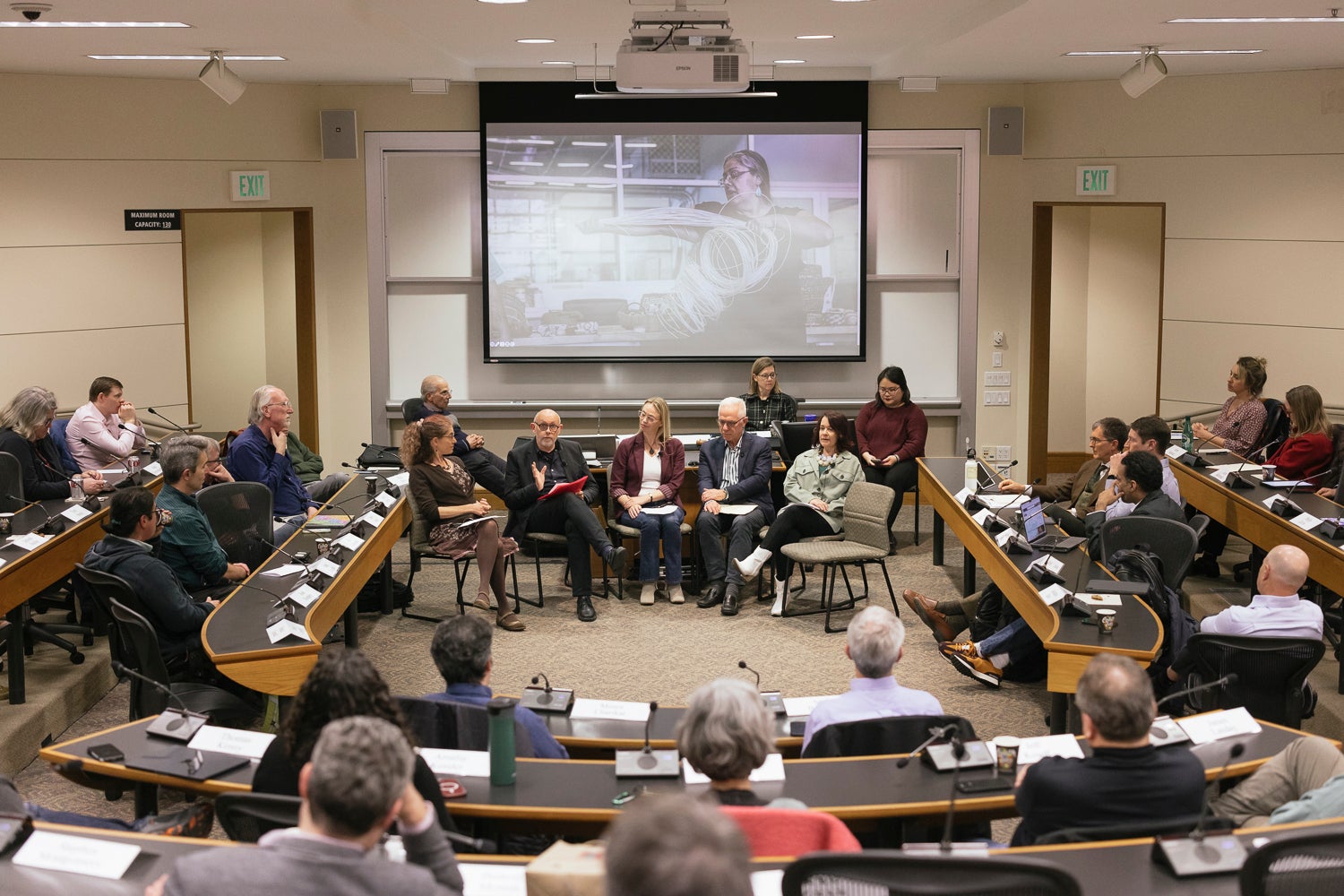Arts deeply woven into university life, scholars tell Faculty Senate
The Faculty Senate heard a presentation on “The Arts at Stanford” as well as updates on the current work of several Academic Council committees on Thursday.

The Faculty Senate heard a presentation on the arts at Stanford during their meeting on Thursday, March 7. (Image credit: Andrew Brodhead)
The arts play a strong, vibrant, and multidisciplinary role combining hands-on creative work with critical scholarship for faculty and students at Stanford, scholars told the Faculty Senate on Thursday.
“Something that distinguishes Stanford from our peer institutions is the ways in which the arts are integrated into university life,” said Gabriella Safran, senior associate dean of humanities and arts in the School of Humanities and Sciences. “The modal Stanford student programs computers by day and practices violin by night, or maybe they practice violin by day and program computers by night.”
Safran was joined in discussion by Pavle Levi, the Osgood Hooker Professor in Fine Arts and professor of art and art history; Stephen Hinton, the Avalon Foundation Professor in Humanities and professor of music and, by courtesy, of German studies; Diana Looser, associate professor of theater and performance studies; and Vice President for the Arts Deborah Cullinan.
Whether in film and media, music, theater and performance, or other areas of the arts, students at Stanford frequently intersect their work with other research. For example, some ongoing work centers artificial intelligence, the aesthetic and experiential dimension of AI-generated content, and ethics, Levi said. “We have among us at Stanford today some of the most innovative thinkers and creative makers whose work is setting the highest standards of practice and scholarship in the arts.”
Graduate studies in the arts at Stanford not only help equip doctoral students with the professional skills they need to take leading roles in the academy and the creative industries, Looser said, but also allow them to conduct innovative arts research that actively expands and refines the field.
“They are experimenters, theorists, critics, historians, and ethnographers, as well as playwrights, directors, performers, choreographers, and designers. We train our students to work in both collaborative and independent research settings,” she added. “Along with our faculty, they craft and test new approaches to thinking about the performing arts and their applications, and develop new paradigms that guide theory and practice.”
Among undergraduates, the largest minors in the university are creative writing and music, Safran explained, and arts practice enrollments, particularly in music performance, have significantly increased in recent years.
As such, the Arts at Stanford strive to accommodate all of the community’s requests for enrollment and offerings, especially as the university tries to balance the needs of both advanced and introductory-level arts students.
One senator asked about how Stanford can help support diminishing arts resources in area schools as well as engage with other outside communities. The university works with an area school district fostering its music program, Cullinan said, and in particular, the Institute for Diversity in the Arts is focused on guiding students who want to combine art and social practice.
Academic Council Committees
The senate also learned about the current work of several Academic Council committees, including the Committee on Academic Computing and Information Systems (C-ACIS), Committee on Graduate Studies (C-GS), Committee on Libraries (C-Lib), Committee on Research (C-Res), Committee on Review of Undergraduate Majors (C-RUM), and Committee on Undergraduate Standards and Policies (C-USP).
The committees of the Academic Council are created by the Faculty Senate and are appointed by the senate’s Committee on Committees. They regularly consider matters that are later discussed and acted upon by the Faculty Senate.
One senator asked how the committees collect community input and decide which issues to deliberate. Committee chairs explained that the matters they address can come before them in a variety of ways, including through individual faculty members, other committees, or via proactive outreach.
In other matters
The Faculty Senate voted to table a discussion to rescind a 2020 resolution condemning actions of Scott Atlas, a senior fellow at the Hoover Institution who served as a special assistant to President Donald Trump on COVID-19 issues.
The Steering Committee also announced that it is creating a planning and policy board to consider the senate’s role and processes in instances such as those that led up to the condemnation of Atlas.
Separately, President Richard Saller answered several questions related to the end of overnight camping in White Plaza and recent protests disrupting community events. Saller emphasized that some media coverage of these matters has been inaccurate. He noted changes were made to address safety concerns and added that in the context of thousands of classes offered across campus, disruptions have been minimal.
In addressing the senate, Provost Jenny Martinez announced that Jeff Koseff will be ending his term as the Faculty Athletics Representative. Koseff is the William Alden Campbell and Martha Campbell Professor in the School of Engineering, professor of oceans and of civil and environmental engineering, and a senior fellow at the Stanford Woods Institute for the Environment. Jay Mitchell, professor emeritus of law, will succeed Koseff within the coming months.
Martinez also announced that Tom Wasow, the Clarence Irving Lewis Professor in Philosophy, Emeritus, and professor emeritus of linguistics, will be ending his term as academic secretary at the end of this academic year. The three previous chairs of the Faculty Senate will form a search committee to identify candidates for the position.
In memory
Senators also heard a memorial resolution for David Katzenstein, 69, professor emeritus of infectious diseases and geographic medicine at Stanford Medicine. He died Jan. 25, 2021.
Koseff is also director of the Change Leadership for Sustainability Program. Safran is the Eva Chernov Lokey Professor in Jewish Studies and professor of Slavic languages and literatures and, by courtesy, of German studies and of comparative literature.